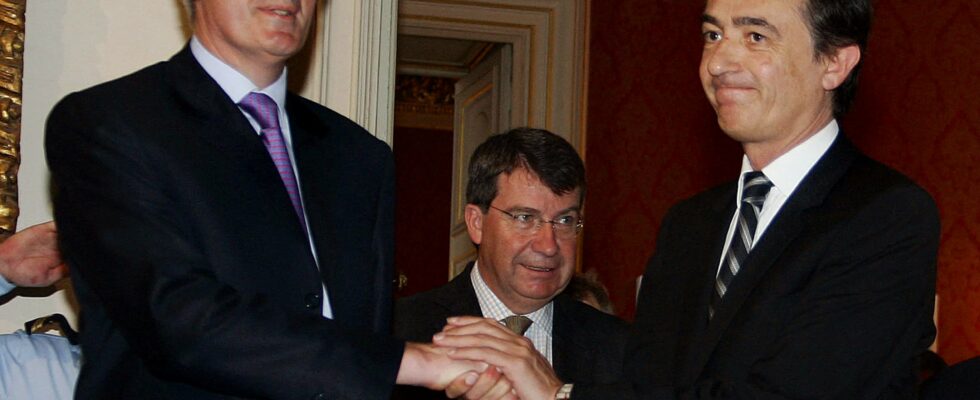The nickname, it was they who found it, who chose it. The Dirty Dozen is a 1967 film by Robert Aldrich, starring Lee Marvin, Charles Bronson and John Cassavetes. During World War II, twelve criminals, all sentenced to death, hard labor or long prison sentences, are offered a suicide mission that could earn them amnesty: attack a castle near Rennes. In this case, that’s not the subject.
Simply, there are twelve of them. They? Yes, only men, at the time you could still launch a political adventure by leaving parity in the closet. It was 1989. A year earlier, in the presidential election, François Mitterrand crushed Jacques Chirac. The socialist thus sent the right back to its studies. However, some within it would like to finally take and if possible pass an exam. The European elections are looming, but it is the old guard who still want to hold the top of the bill. Former president Valéry Giscard d’Estaing would be at the head of a joint list, with Edouard Balladur as number 2, pushed by Jacques Chirac. Obviously, the casting does not please everyone, and there is a bunch of forty-somethings who are making fun of a “Louis XV-Louis XVI list”.
How, at the same time, can we get out of the war of the chiefs and mothballs? This is where our twelve bastards come in. Some have already made headlines, like Michel Noir, Alain Carignon or Philippe de Villiers, media ministers of the first cohabitation. The first declared, in a resounding interview granted to Worldto protest against possible alliances with the extreme right: “It is better to lose the elections than to lose your soul.” The second had his moment of glory by driving the left out of Grenoble in the 1983 municipal elections. The third, who was propelled to the forefront by the success of the Puy-du-Fou show, was a Secretary of State for Culture who did not go unnoticed. Philippe Séguin was there, coming with two close friends, François Fillon and Etienne Pinte. François Bayrou, whose politics already ran through his veins, was accompanied by Dominique Baudis and Bernard Bosson. Charles Millon and François d’Aubert completed the team.
And then there is a certain Michel Barnier. He has been a member of parliament for eleven years and president of the Savoie general council for seven years. One of the twelve remembers, or rather does not remember, much: “If he is in the mix, he did not try to take the lead. He is there, but he does not take the blows, he has the advantages without the disadvantages. He managed to slip through the cracks.” The storm is nevertheless violent. It all begins with a meticulously prepared interview that Charles Millon grants to Release : the president of the Rhône-Alpes region calls for a “cultural revolution” and asks that a list symbolizing “renewal” have “the courage” to be formed for the European elections of June 1989. Resistance is strong. The young Nicolas Sarkozy tries to dissuade some: “It’s stupid to be in the middle of twelve people of the same generation, you have to be behind the older person in charge!”
“He wasn’t a leader, he was a follower”
Ten days later, a moment occurred that would go down in media political history. On TF1’s 8pm news, the high mass watched by millions of viewers, Dominique Baudis appealed to Giscard: “Make the gesture that the country expects of you, bearing the future: pass the torch to a new team.” The next morning, at dawn, the mayor of Toulouse was summoned by Jacques Chirac. The meeting remained shrouded in mystery. Did the RPR president threaten him with reprisals in one way or another? In the aftermath, the adventure fizzled out. The renovators returned home and gave up running.
Michel Barnier “was not a leader, he was a follower, he has always been like that because he does not like political fighting”, another says modestly. He had already spoken to Valéry Giscard d’Estaing, in a completely different atmosphere. In the period between the two rounds of the 1981 presidential election, for an official campaign broadcast, the incumbent asked him to play the role of interviewer for a television programme. VGE chose him because he was “the youngest member of the Assembly”. Here is the RPR deputy questioning the president: “At the time of the elections, you proposed, as if by miracle, a programme to eliminate youth unemployment, why did you not implement it earlier?” “We started much earlier and as a parliamentarian, you know this since you were involved in it”, the head of state retorted. The Gaullists were then reluctant to support Giscard and felt badly treated.
In 1989, Michel Barnier is there, in one of the rare photos of the twelve suits and ties. He is at the end of the row, between Michel Noir and Philippe Séguin. The Savoyard is one of the figures of renewal, but the most active are called Baudis, Noir, Séguin, Millon and Bayrou. He is 38 years old. That was 35 years ago.
.
